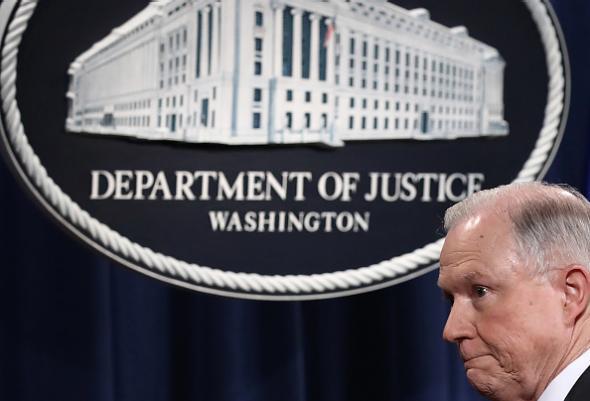On Thursday afternoon, Attorney General Jeff Sessions held a press conference to announce that he was recusing himself from any possible investigations into connections between Donald Trump’s campaign and Russia. It was a dissembling performance that demonstrated why his recusal is not enough. There is no evidence that Sessions did or said anything wrong in the previously undisclosed meetings with Russian Ambassador Sergey Kislyak that the Washington Post revealed on Wednesday. But he still doesn’t have a remotely plausible explanation for why he covered the meetings up, and he has no business serving as the country’s chief law enforcement officer. The public should pressure its representatives to demand that he step down.
If Sessions is to be believed, his decision to remove himself from overseeing probes into Trump and Russia has nothing to do with Wednesday’s news. He insisted he’d planned the recusal earlier in the week, and the announcement just happened to fall on the day after the world learned that he’d misled the Senate Judiciary Committee about his Russian contacts. He also, apparently, didn’t discuss this long-planned recusal with the president or the president’s spokesman, both of whom said earlier Thursday that Sessions’ recusal wasn’t necessary.
This was about as credible as Sessions’ explanation of why he’d denied meeting with Russian officials in verbal Judiciary Committee testimony and then denied having any contact with Russians “about the 2016 election” in a sworn written response. You should watch his explanation yourself; it was garbled enough that I’m not quite sure how to render it. Basically, Sessions said he was “taken aback” by a question from Sen. Al Franken referring to allegations that Trump surrogates had been meeting “continuously” with Russian officials. “That’s what I focused my answer on,” he said. Perhaps, but nothing in his testimony suggests he thought he was talking about “continuous” contact, as opposed to just, well, contact. As he said then: “I have been called a surrogate at a time or two in that campaign, and I did not have communications with the Russians.”
If Sessions was taken aback by Franken’s question, he should have had time to compose himself before Sen. Patrick Leahy submitted a similar query in writing seven days later. “Have you been in contact with anyone connected to any part of the Russian government about the 2016 election, either before or after election day?” Leahy asked. This time Sessions gave a one word answer: “No.” When the Washington Post’s story came out on Wednesday night, Sessions released a statement saying he “never met with any Russian officials to discuss issues of the campaign.” The word “to” is doing a lot of work here. Even if you believe that the meeting wasn’t set up in order to discuss the campaign, it seems inconceivable that campaign issues didn’t come up. Sessions himself didn’t exactly deny this at Thursday’s press conference: “Most of these ambassadors are pretty gossipy, and this was in the campaign season, but I don’t recall any specific political discussions.”
Like the Trump-Russia story more broadly, much of the Sessions-Kislyak subplot remains hazy. We still don’t know why he met with the ambassador or his motives for dissembling. We don’t yet know if his untruths meet the legal threshold for perjury, though some ethics scholars have suggested that they do. One thing, however, is clear: Sessions’ recusal is not enough to put this issue to bed.
“He needs to resign,” says California Rep. Ted Lieu, who joined all the other Democrats on the House Judiciary Committee in calling for a criminal investigation of Sessions. “Michael Flynn resigned for lying to the American people, and that wasn’t under oath. Sessions lied under oath to the American people.”
It remains to be seen what sort of political price he will pay. Republicans will claim that his recusal settles the matter, and Democrats lack the power to force accountability. Some Democrats are hopeful, however, that the pressure for a sweeping investigation will become overwhelming. If that happens, Sessions’ lies will come under the microscope. “There will have to be that investigation as part of the larger investigation,” says Rep. Jerrold Nadler, a senior member of the House Judiciary Committee. “Did other people commit perjury? Did other people lie? Did people in the Trump campaign have contact with the Russians, maybe with Russian intelligence agencies? Were they breaking laws? Did the candidate know?”
With the revelations of Sessions’ deception, Nadler says, the momentum for a thorough investigation is building. “It seems like Trump’s been in office forever, but he’s only been in office 40 days,” he says. “It’s agonizing and it feels slow, but it’s very fast.”
